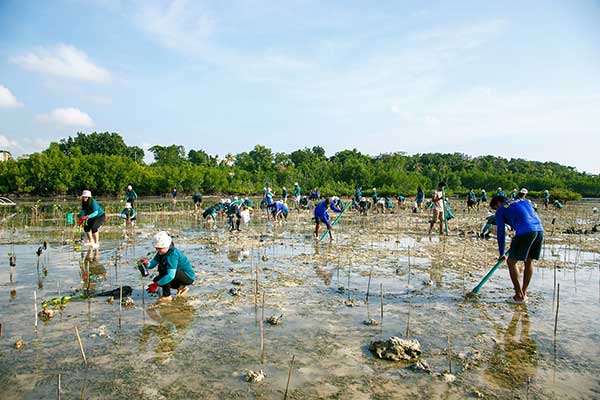
Planting mangroves on seagrass beds is an “ecological scandal,” according to mangrove expert Jurgenne Primavera, who criticized Cathay Pacific’s recent initiative to plant 5,000 mangrove seedlings in Carcar City, Cebu.
Primavera outlined the potential ecological consequences of the project and called for science-based conservation practices to protect marine ecosystems.
“First, seagrass beds form an ecosystem by themselves. Their inhabitants like dugong, pawikan, seahorses, rabbitfish/danggit, etc., will disappear if replaced by mangroves. It is WRONG to rob Peter (seagrasses) in order to pay Paul (mangroves),” Primavera said.
She also highlighted the impact of rising sea levels, noting that seagrass habitats would be more suitable for subtidal plants, while intertidal mangroves, such as bakhaw, are unlikely to thrive.
“Coastal seawater levels will grow deeper, making the habitat suitable for subtidal plants like seagrasses. Intertidal trees, like mangroves, will drown because they need the tidal ebb and flow, with 70% of time emerged above the water, to survive,” she explained.
Primavera warned that planting the wrong mangrove species in unsuitable areas could result in their early death or destruction during typhoons.
“Bakhaw that are broken or damaged will die because they have no apical meristem or tissues responsible for regenerating new leaves and branches,” she said.
She recommended resilient species like pagatpat and piapi, which can regenerate and recover from strong storms.
Primavera, a marine biologist and one of the world’s foremost mangrove experts, has been recognized internationally for her work on coastal ecosystem conservation. She is a Pew Fellow in Marine Conservation and a recipient of the TIME Hero of the Environment award.
Primavera has spent decades advocating for sustainable mangrove management and conservation practices.
Cathay Pacific’s mangrove planting was part of its “1 Ticket, 1 Tree and 1 Tonne, 1 Tree” campaign, which involves planting trees for every flight ticket sold and cargo tonne shipped.
The project, which revisited earlier plantings in Barangay Tuyom, aimed to offset environmental impacts with the help of over 60 volunteers from the airline and its partners.
While acknowledging the airline’s intentions, Oceana Vice President Atty. Gloria Estenzo Ramos echoed Primavera’s concerns.
“Mangrove species should be correctly selected and planted in the right coastal zones to ensure the survival and long-term success of mangrove reforestation, as well as the overall health of coastal and marine environments,” Ramos said.
Oceana, an international advocacy group dedicated to ocean conservation, has been active in the Philippines in promoting sustainable fisheries, marine biodiversity preservation, and climate resilience. It is known for its campaigns to enforce fishery laws and protect critical habitats such as mangroves, coral reefs, and seagrass beds.
The group called on Cathay Pacific and local authorities to align their efforts with scientific guidelines, including the Joint Ecosystems Research and Development Bureau-Biodiversity Management Bureau Technical Bulletin 2017-01 and the Department of Environment and Natural Resources (DENR) memorandum issued in January 2024. These guidelines prohibit mangrove planting in sensitive areas like seagrass beds, mudflats, and tidal flats.
Despite the criticisms, Cathay Pacific highlighted the success of its initiative, noting the growth of mangroves planted in April 2024.
However, Primavera and Oceana stressed the importance of using a science-based approach to ensure conservation efforts enhance, rather than harm, marine ecosystems.





















